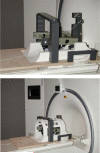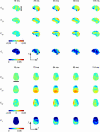Deformation of the human brain induced by mild acceleration
- PMID: 16083352
- PMCID: PMC2377024
- DOI: 10.1089/neu.2005.22.845
Deformation of the human brain induced by mild acceleration
Abstract
Rapid deformation of brain matter caused by skull acceleration is most likely the cause of concussion, as well as more severe traumatic brain injury (TBI). The inability to measure deformation directly has led to disagreement and confusion about the biomechanics of concussion and TBI. In the present study, brain deformation in human volunteers was measured directly during mild, but rapid, deceleration of the head (20-30 m/sec2 peak, approximately 40 msec duration), using an imaging technique originally developed to measure cardiac deformation. Magnetic resonance image sequences with imposed "tag" lines were obtained at high frame rates by repeating the deceleration and acquiring a subset of image data each repetition. Displacements of points on tag lines were used to estimate the Lagrangian strain tensor field. Qualitative (visual) and quantitative (strain) results illustrate clearly the deformation of brain matter due to occipital deceleration. Strains of 0.02-0.05 were typical during these events (0.05 strain corresponds roughly to a 5% change in the dimension of a local tissue element). Notably, compression in frontal regions and stretching in posterior regions were observed. The motion of the brain appears constrained by structures at the frontal base of the skull; it must pull away from such constraints before it can compress against the occipital bone. This mechanism is consistent with observations of contrecoup injury in occipital impact.
Figures







References
-
- Axel L, Dougherty L. MR imaging of motion with spatial modulation of magnetization. Journal of Biomechanics. 1989;171(3):841–845. - PubMed
-
- Bain AC, Meaney DF. Tissue-level thresholds for axonal damage in an experimental model of central nervous system white matter injury. Journal of Biomechanical Engineering. 2000;122:615–622. - PubMed
-
- Geddes DM, Cargill RS, LaPlaca MC. Mechanical stretch to neurons results in a strain rate and magnitude-dependent increase in plasma membrane permeability. Journal of Neurotrauma. 2003;20(10):1039–1049. - PubMed
-
- Graham DI, Adams JH, Nicoll JAR, Maxwell WL, Gennarelli TA. The nature, distribution and causes of traumatic brain injury. Brain Pathology. 1995;5:397–406. - PubMed
Publication types
MeSH terms
Grants and funding
LinkOut - more resources
Full Text Sources
Other Literature Sources
Medical

